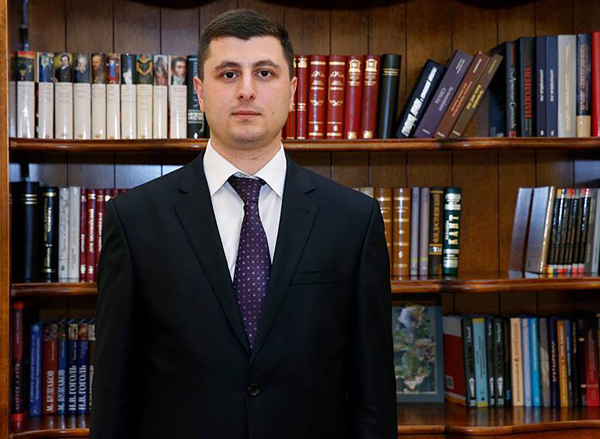Political analyst Tigran Abrahamyan about the material losses caused to the Armenian side and financial barriers of the Russian-Azerbaijani relations
– The agreement signed between Baku and Moscow in 2010-2014, according to which Moscow was to sell weapons and ammunition to Baku worth of 4 billion US dollars seems to become a headache for Azerbaijan. According to the Moscow «Комерсантъ» Daily, due to the fall in oil prices in the international market, Azerbaijan is unable to pay for Russian weapons. Though most part of the agreement has been already implemented, however, as the newspaper reports, a certain number of tanks, armored vehicles and a number of artillery systems are still in stock in the Russian enterprises. Russian Deputy Prime Minister Dmitry Rogozin arrived in the capital of Azerbaijan, and as the newspaper reports, Russia is displaying a quite tough position on this issue and is reluctant to go for concessions. What are the developments of Russian-Azerbaijani escalations in the military-technical industry, in your opinion?
– The drastic fall in the prices of world energy carriers had caused a significant impact on the economy of Azerbaijan, which will require a long time for eliminations of the consequences. And the fact that Azerbaijan has serious difficulties in the timely transference of the money for the supply received from Russia is not accidental. Over the past 1-2 years, Azerbaijan’s international reserves dropped sharply, there are serious problems with budget performance, and no particular optimistic trends are observed in the economy of Azerbaijan. It is clear that in this situation Azerbaijan is trying thru negotiations, on the one hand, to extend the deadlines of the payment for the supply of arms from Russia, on the other hand, to ensure necessary supply of arms within short terms. The difficulties associated with this transaction between Azerbaijan and Russia, first of all, is a serious blow to Azerbaijan’s ruling elite as the country’s state propaganda was built on overloading the country with a large number of arms and military equipment, and thereby, on the military balance in the region in favor of deviation of Azerbaijan. As for the developments connected with this event, I think that it will not have a major effect on the relations between Azerbaijan and Russian in the spheres of military and technical. Actually, Russia also understands that driven by Azerbaijan’s economic situation, there are serious problems which are mainly of an objective nature, and thereby, Russia does not want to complicate the bilateral relations at this stage. Azerbaijan is an important country for Russia as a market and because of these problems, hardly would Moscow officially go to drastic moves. Azerbaijan’s economic situation, in mid-term, would impact on the transactions planned in the near future, the imports will be slightly reduced but the Azerbaijani authorities will do everything possible to bring the transactions concluded in the phase of pre-crisis to the end, I repeat, this is very important for Azerbaijan’s ruling elite to keep the government.
– To the point, no matter how impressive were the weapons, which Russia was to provide to Armenian by this 200 million US dollar loan, no matter Azerbaijan is afraid of this list, the publication of the list of these weapons was not unequivocally perceived in Armenia. The agreement was confidential, and the Russian side has unilaterally decided to reveal the secret by putting its allegedly strategic partner – Armenia – in an awkward situation, by all its terms. What is your point of view on this?
Read also
– Such problems, including the issue of publishing the supplied weapons, as a rule, is regulated by bilateral agreement, and I do not think that it was a surprise for the Defense Ministry of Armenia, especially, to create awkward situations. As for Azerbaijan being scared, then Azerbaijan naturally approached this transaction with reservations, moreover, they sent a protest note to Russia but it was of a more formal nature.
– Recently, Azerbaijan is displaying relatively passive posture. The Armenian-Azerbaijani border and the line of contact are relatively quiet. How do you explain this?
– It is only at first glance. Simply, unlike the “escalation in the fall”, Azerbaijan has gone to some tactical changes. If in the phase of earlier escalations in the autumn, Azerbaijan was putting accent on the artillery, rocket launchers, other large-caliber strikes, then in the current phase, then sabotage and intelligence groups and snipers who are constantly trying to create anxiety and tension in the frontier for the military units on duty are moved to the first plan. Azerbaijani subversive and sniper groups activeness have been significantly increased, at this stage, Azerbaijan more tends to cause material damage to the Armenian side. Hence, the Armenian armed forces, especially special units, are implementing serious operations aimed at suppressing the activeness of Azerbaijan. For obvious reasons, not everything that is visible to the public, the majority of them is subject to making public.
– Why is the emphasis put on causing material damages?
– In the case of human losses, Armenia’s response is incomparably stronger while in the event of socio-escalations available in Azerbaijan, the tough strikes by Armenian side may contribute to the complication of the domestic political situation in Azerbaijan. I think that it is one of the reasons that Azerbaijan displays another approach to the frontier processes in this period. It is more cautious.
Interviewed by Nelly GRIGORYAN, “Aravot” daily























































